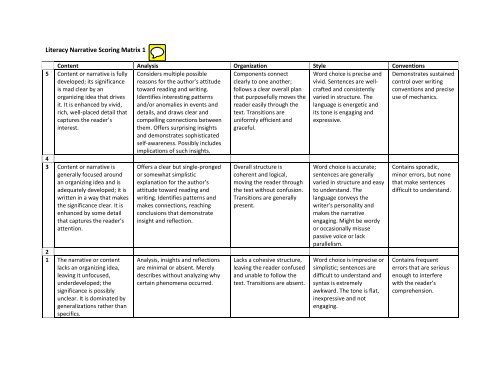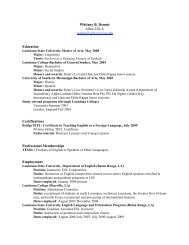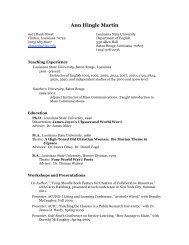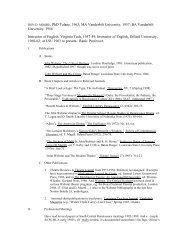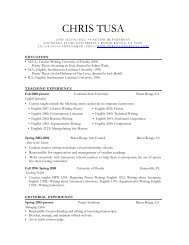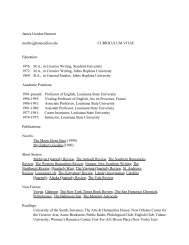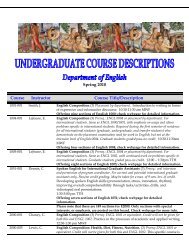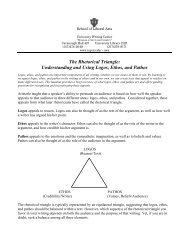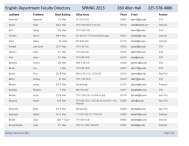Literacy Narrative Scoring Matrix 1
Literacy Narrative Scoring Matrix 1
Literacy Narrative Scoring Matrix 1
You also want an ePaper? Increase the reach of your titles
YUMPU automatically turns print PDFs into web optimized ePapers that Google loves.
<strong>Literacy</strong> <strong>Narrative</strong> <strong>Scoring</strong> <strong>Matrix</strong> 1<br />
Content Analysis Organization Style Conventions<br />
5 Content or narrative is fully<br />
developed; its significance<br />
is mad clear by an<br />
organizing idea that drives<br />
it. It is enhanced by vivid,<br />
rich, well-placed detail that<br />
captures the reader’s<br />
interest.<br />
Components connect<br />
clearly to one another;<br />
follows a clear overall plan<br />
that purposefully moves the<br />
reader easily through the<br />
text. Transitions are<br />
uniformly efficient and<br />
graceful.<br />
Word choice is precise and<br />
vivid. Sentences are wellcrafted<br />
and consistently<br />
varied in structure. The<br />
language is energetic and<br />
its tone is engaging and<br />
expressive.<br />
4<br />
3 Content or narrative is<br />
generally focused around<br />
an organizing idea and is<br />
adequately developed; it is<br />
written in a way that makes<br />
the significance clear. It is<br />
enhanced by some detail<br />
that captures the reader’s<br />
attention.<br />
2<br />
1 The narrative or content<br />
lacks an organizing idea,<br />
leaving it unfocused,<br />
underdeveloped; the<br />
significance is possibly<br />
unclear. It is dominated by<br />
generalizations rather than<br />
specifics.<br />
Considers multiple possible<br />
reasons for the author’s attitude<br />
toward reading and writing.<br />
Identifies interesting patterns<br />
and/or anomalies in events and<br />
details, and draws clear and<br />
compelling connections between<br />
them. Offers surprising insights<br />
and demonstrates sophisticated<br />
self-awareness. Possibly includes<br />
implications of such insights.<br />
Offers a clear but single-pronged<br />
or somewhat simplistic<br />
explanation for the author’s<br />
attitude toward reading and<br />
writing. Identifies patterns and<br />
makes connections, reaching<br />
conclusions that demonstrate<br />
insight and reflection.<br />
Analysis, insights and reflections<br />
are minimal or absent. Merely<br />
describes without analyzing why<br />
certain phenomena occurred.<br />
Overall structure is<br />
coherent and logical,<br />
moving the reader through<br />
the text without confusion.<br />
Transitions are generally<br />
present.<br />
Lacks a cohesive structure,<br />
leaving the reader confused<br />
and unable to follow the<br />
text. Transitions are absent.<br />
Word choice is accurate;<br />
sentences are generally<br />
varied in structure and easy<br />
to understand. The<br />
language conveys the<br />
writer’s personality and<br />
makes the narrative<br />
engaging. Might be wordy<br />
or occasionally misuse<br />
passive voice or lack<br />
parallelism.<br />
Word choice is imprecise or<br />
simplistic; sentences are<br />
difficult to understand and<br />
syntax is extremely<br />
awkward. The tone is flat,<br />
inexpressive and not<br />
engaging.<br />
Demonstrates sustained<br />
control over writing<br />
conventions and precise<br />
use of mechanics.<br />
Contains sporadic,<br />
minor errors, but none<br />
that make sentences<br />
difficult to understand.<br />
Contains frequent<br />
errors that are serious<br />
enough to interfere<br />
with the reader’s<br />
comprehension.
<strong>Literacy</strong> <strong>Narrative</strong> <strong>Scoring</strong> <strong>Matrix</strong> 2<br />
Content<br />
5 Content or<br />
narrative is fully<br />
developed; it is<br />
enhanced by vivid,<br />
rich, well-placed<br />
detail that<br />
captures the<br />
reader’s interest.<br />
4<br />
Thesis or<br />
Controlling idea<br />
Driven by a<br />
controlling idea<br />
that makes the<br />
content<br />
compelling and<br />
significant.<br />
Analysis Organization Style Conventions<br />
Considers multiple possible reasons<br />
for the author’s attitude toward<br />
reading and writing. Identifies<br />
interesting patterns and/or<br />
anomalies in events and details, and<br />
draws clear and compelling<br />
connections between them. Offers<br />
surprising insights and demonstrates<br />
sophisticated self-awareness.<br />
Possibly includes implications of<br />
such insights.<br />
Components connect<br />
clearly to one another;<br />
follows a clear overall<br />
plan that purposefully<br />
moves the reader easily<br />
through the text.<br />
Transitions are uniformly<br />
efficient and graceful.<br />
Word choice is precise and<br />
vivid. Sentences are wellcrafted<br />
and consistently<br />
varied in structure. The<br />
language is energetic and<br />
its tone is engaging and<br />
expressive.<br />
Demonstrates<br />
sustained<br />
control over<br />
writing<br />
conventions<br />
and precise use<br />
of mechanics.<br />
3 Content or<br />
narrative is<br />
adequately<br />
developed; it is<br />
enhanced by<br />
some detail that<br />
captures the<br />
reader’s<br />
attention.<br />
A controlling idea<br />
is present and the<br />
content is<br />
generally focused<br />
on it. The<br />
significance is<br />
clear.<br />
Offers a clear but single-pronged or<br />
somewhat simplistic explanation for<br />
the author’s attitude toward reading<br />
and writing. Identifies patterns and<br />
makes connections, reaching<br />
conclusions that demonstrate insight<br />
and reflection.<br />
Overall structure is<br />
coherent and logical,<br />
moving the reader<br />
through the text without<br />
confusion. Transitions are<br />
generally present.<br />
Word choice is accurate;<br />
sentences are generally<br />
varied in structure and easy<br />
to understand. The<br />
language conveys the<br />
writer’s personality and<br />
makes the narrative<br />
engaging. Might be wordy<br />
or occasionally misuse<br />
passive voice or lack<br />
parallelism.<br />
Contains<br />
sporadic, minor<br />
errors, but none<br />
that make<br />
sentences<br />
difficult to<br />
understand.<br />
2
1 The narrative or<br />
content is<br />
underdeveloped.<br />
It is dominated by<br />
generalizations<br />
rather than<br />
specifics.<br />
Lacks a<br />
controlling idea<br />
and as a result is<br />
unfocused;<br />
significance of<br />
events is unclear.<br />
Analysis, insights and reflections are<br />
minimal or absent. Merely describes<br />
without analyzing why certain<br />
phenomena occurred.<br />
Lacks a cohesive<br />
structure, leaving the<br />
reader confused and<br />
unable to follow the text.<br />
Transitions are absent.<br />
Word choice is imprecise or<br />
simplistic; sentences are<br />
difficult to understand and<br />
syntax is extremely<br />
awkward. The tone is flat,<br />
inexpressive and not<br />
engaging.<br />
Contains<br />
frequent errors<br />
that are serious<br />
enough to<br />
interfere with<br />
the reader’s<br />
comprehension.


